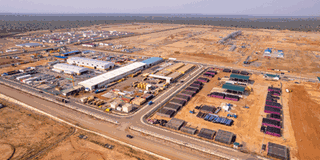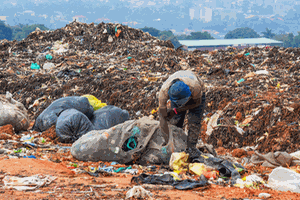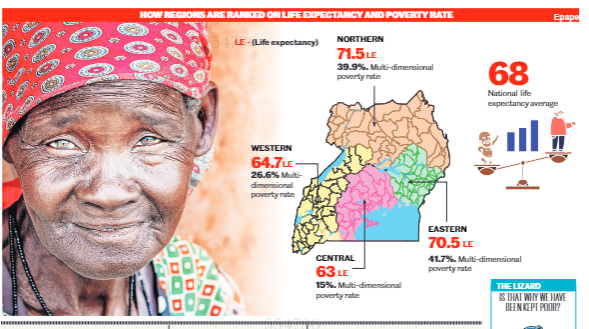Eacop developers start academy to feed $15b oil projects

Tilenga Industrial Area. According to the Energy Ministry, drilling of 63 out of the planned 426 wells in the Tilenga project was successfully completed. PHOTO/ NELSON NATURINDA
What you need to know:
The Academy is building a foundation for the future workforce in Tanzania and Uganda, with skills and expertise that will enable the trainees to thrive in the oil and gas sector.
As midstream activity intensifies with the construction of the East African Crude Oil Pipeline (Eacop), its developers have started an academy to nurture talent for the sector in Uganda and Tanzania as they bid to raise local content numbers to feed projects worth $15 billion with a skilled workforce.
Dubbed the “Eacop Academy”, it was inaugurated on September 18, at Mt. Meru Hotel in Arusha, Tanzania, made possible through the Eacop Massive Open Online Course (MOOC) and Memoranda of Understanding signing with Arusha Technical College and Vocational Education and Training Authority – both Tanzania-based – as well as Uganda Petroleum Institute Kigumba.
The Eacop Academy manager Laurent Stephane says the institution is building a foundation for the future workforce in Tanzania and Uganda, with skills and expertise that will enable the trainees to thrive in the oil and gas sector and beyond, contributing to sustainable development in their countries.
Officials said these institutions will focus on empowering the youth in regions adjacent to the pipeline’s construction and operational areas, to provide world-class training and development opportunities in the oil and gas sector.
The academy’s products eye opportunities in Uganda’s oil and gas projects which include Eacop as well as the upstream Tilenga and Kingfisher oilfields, into which French super major TotalEnergies and China National Offshore Oil Corporation (Cnooc) announced a $10 billion investment in 2022.
Another potential employer is the planned 60,000 barrels per day oil refinery project, which the Uganda government has invited a consortium led by United Arab Emirates firm Alpha MBM Investments LLC, through a memorandum of understanding to develop the facility, expected to cost $4.5 billion.
A total of 143 trainees have been selected from the Eacop MOOC, and are now being prepared to take on essential roles within the project’s field operations team, armed with the skills and knowledge necessary to contribute effectively to the pipeline’s execution and delivery within the target timelines.
“By equipping local talent with the necessary skills and knowledge, we are investing in the future of these countries and ensuring that the benefits of this project are shared widely,” said Martin Tiffen, Eacop Ltd managing director.
This comes at a time the oil and gas projects are racing against time to beat the late 2025 target date for first oil, with the construction of Eacop’s above-the-ground installations underway in Uganda and Tanzania, while the upstream oilfield development is also at an advanced stage.
According to the latest update from the Ministry of Energy, drilling of 63 out of the planned 426 wells in the TotalEnergies operated Tilenga project was completed, with positive hydrocarbon shows in the targeted reservoirs.
Drilling activities have focused on six of the 31 well pads that will host 426 producer and injector wells for the Tilenga project.
“All three rigs designated for drilling are operational, and 63 wells have been drilled as of August 16, 2024. Currently, seven well pads are over 85 percent complete and ready to receive a rig,” said Energy Minister Ruth Nankabirwa last month.
Meanwhile, the Kingfisher oilfield – which is designated to produce Uganda’s first barrels of oil – nine of the 11 wells, required for the first oil have been successfully drilled. With a single rig on the shores of Lake Albert in Kikuube District, Kingfisher is operated by Cnooc.
Ms Nankabirwa highlighted the significance of local content to realising the benefits from the oil and gas sector, as Ugandan companies take up deals to supply goods and services for projects, with local firms taking at least $2 billion out of the $5 billion worth of contracts awarded so far.
“Notably, $2 billion – representing 41 percent of the total contracts awarded – have been allocated to Ugandan companies, underscoring a strong commitment to local content and ensuring that significant benefits from these projects are retained within the country,” she said.
The Ministry’s update also revealed that the oil and gas sector directly employed 14,451 people, 90 percent of whom are Ugandans, with the licensed operators TotalEnergies and Cnooc directly employing 1,403 people, 67 percent of these being nationals.
Contractors of the licensed upstream project operators, and their sub-contractors have so far employed 13,399 people, of whom 92 percent are Ugandans, and the companies have sourced 4,483 employees from the local communities.
Oil and gas companies require workers with a mastery of industry-specific skills to meet environmental, technical, and safety standards.




